This morning, August 5th 2024, at 08.00 Western Indonesia Time (GMT+7), marked the 7th day of the Summer Course (SC) 2024 held by the Faculty of Agricultural Technology, Universitas Gadjah Mada.
There were 4 speakers, 3 online and 1 on-site. The first lecture was on Water Management and Quality for the Agricultural System, moderated by Dr. Prieskarinda Lestari from FAT UGM. Prof. Gary R. Sands, Ph.D., Professor from University of Minnesota USA, explained the global distribution of agricultural areas and the global land used for food production. He mentioned the challenge and obstacles of global water issues especially in the agricultural sector and elaborated the solution as well as the opportunity for reducing agriculture’s water footprint to restore water quantity and quality.
Before continuing to the next session, we had a coffee break from 09.45-10.15. The second lecture was on Irrigation and Climate Change, moderated by Muhammad Khoiru Zaki, Ph.D from FAT UGM. Prof. Dr. Ki Hee Ryu, Professor from Seoul National University South Korea, explained the global trends for irrigation in climate change mentioning Sustainable Development Goals Target 1 (no poverty), 2 (zero hunger), 6 (clean water and sanitation). He elaborated the effort for irrigation modernization in Indonesia both the challenges and the opportunities.
The second session ended at 12.00 then we moved to the next session which was lunch break and prayer time. The plenary started at 13.00 for the third lecture on Plant Factory, moderated by Imam Bagus Nugroho, M.Sc. from FAT UGM. Dr. Md. Parvez Islam from Ehime University, Japan explained artificial intelligence in agriculture. He showed many graphs about population, grain production and land used in Japan. He elaborated the challenges in the agriculture sector worldwide and the modern way to solve agricultural problems such as automation, AI, and robots to achieve the future vision of the society 5.0 plant factory.
The fourth session started after a 30 minute coffee break around 15.00. It was about Smart Farming and Climate Change, moderated by Bayu Nugraha, Ph.D. from FAT UGM. Bayu Dwi Apri Nugroho (on-site speaker) from FAT UGM explained the basics of climate change, the effect of climate change in the agriculture sector. He mentioned his latest interest in using technology for smart farming systems such as AI to forecast environmental conditions, drone, and smartphone application.

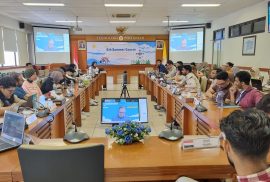
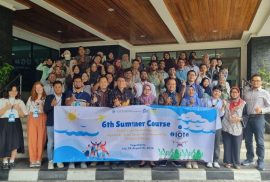
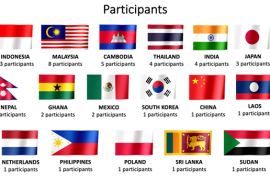
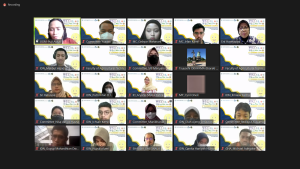
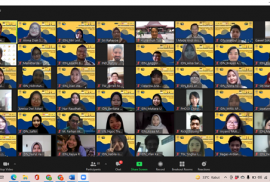
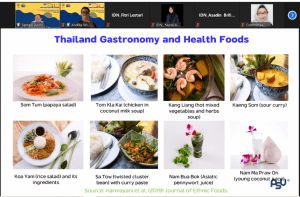 The last day of the 3rd Summer Course of Local Indigenous Functional Food’s Roles in the Era of Covid-19 Pandemic: From Farm to Table was held on July 23rd, 2021. The first session was delivered by Assoc. Prof. Dr. Santad Wichienchot, Ph.D. from Prince of Songkla University about “Influence of Functional Foods on Gut Microbiota”. Prof. Santad explained about functional foods and functional ingredients, gut microbiota, probiotics and prebiotics, and gastronomy.
The last day of the 3rd Summer Course of Local Indigenous Functional Food’s Roles in the Era of Covid-19 Pandemic: From Farm to Table was held on July 23rd, 2021. The first session was delivered by Assoc. Prof. Dr. Santad Wichienchot, Ph.D. from Prince of Songkla University about “Influence of Functional Foods on Gut Microbiota”. Prof. Santad explained about functional foods and functional ingredients, gut microbiota, probiotics and prebiotics, and gastronomy.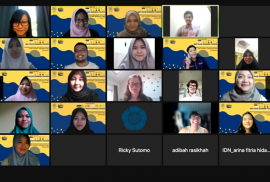
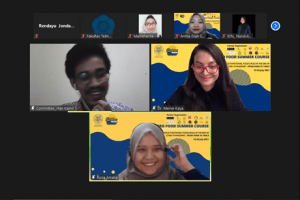 The first session was about “Functional Foods Marketing and Management” which was delivered by Dr. Merve Kaya. The main topic Dr. Merve Kaya discusses is Microalgae. Currently, microalgae are used in agriculture, aquaculture, human nutrition, animal nutrition, and cosmetics. In the future, microalgae might be used for pharmaceuticals, biomaterials, and biofuels. In addition, Microalgae have benefits in many fields such as a plant-based source with eco-friendly extraction, organic base macronutrients, and complete amino acid, and metabolic profiles with free L-amino acids. Other than that the benefits of microalgae were improving crop vigor, creating healthier plants, advancing flowering and seed/fruit development, and increasing the tolerance to abiotic stress. Hence, it is possible to create new agricultural solutions and a sustainable farming environment using microalgae products.
The first session was about “Functional Foods Marketing and Management” which was delivered by Dr. Merve Kaya. The main topic Dr. Merve Kaya discusses is Microalgae. Currently, microalgae are used in agriculture, aquaculture, human nutrition, animal nutrition, and cosmetics. In the future, microalgae might be used for pharmaceuticals, biomaterials, and biofuels. In addition, Microalgae have benefits in many fields such as a plant-based source with eco-friendly extraction, organic base macronutrients, and complete amino acid, and metabolic profiles with free L-amino acids. Other than that the benefits of microalgae were improving crop vigor, creating healthier plants, advancing flowering and seed/fruit development, and increasing the tolerance to abiotic stress. Hence, it is possible to create new agricultural solutions and a sustainable farming environment using microalgae products. In addition, the second session was about “Supply Chain Management in Functional Food Industry” by Prof. Kune-muh Tsai. He opened the discussion with the definition of the supply chain. Other than that, Prof. Kune-muh Tsai gave an example where the functional food industry in Taiwan is mainly distributed across the midstream and the downstream. Next, Prof. Kune-muh Tsai also talked about the functional food supply chain, the differentiation between supply chains of functional food in Taiwan and Brazil, the example of the yogurt supply chain in China, supply chain of challenges of functional food due to trade war and pandemic, cold chain practice (best practice), and international supply chain also explained. Moreover, Prof. Kune-muh Tsai also explained how to control the supply chain risk.
In addition, the second session was about “Supply Chain Management in Functional Food Industry” by Prof. Kune-muh Tsai. He opened the discussion with the definition of the supply chain. Other than that, Prof. Kune-muh Tsai gave an example where the functional food industry in Taiwan is mainly distributed across the midstream and the downstream. Next, Prof. Kune-muh Tsai also talked about the functional food supply chain, the differentiation between supply chains of functional food in Taiwan and Brazil, the example of the yogurt supply chain in China, supply chain of challenges of functional food due to trade war and pandemic, cold chain practice (best practice), and international supply chain also explained. Moreover, Prof. Kune-muh Tsai also explained how to control the supply chain risk.